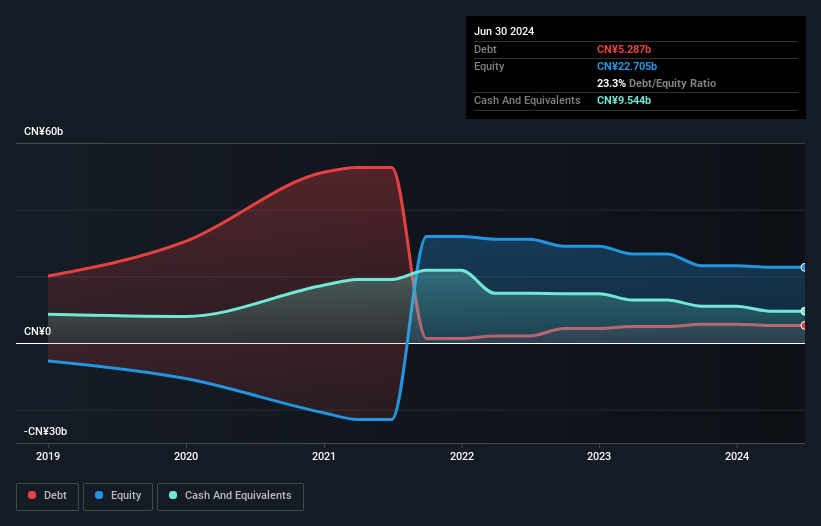Health Check: How Prudently Does SenseTime Group (HKG:20) Use Debt?
Howard Marks put it nicely when he said that, rather than worrying about share price volatility, 'The possibility of permanent loss is the risk I worry about... and every practical investor I know worries about.' So it seems the smart money knows that debt - which is usually involved in bankruptcies - is a very important factor, when you assess how risky a company is. We can see that SenseTime Group Inc. (HKG:20) does use debt in its business. But the more important question is: how much risk is that debt creating?
When Is Debt A Problem?
Debt is a tool to help businesses grow, but if a business is incapable of paying off its lenders, then it exists at their mercy. Ultimately, if the company can't fulfill its legal obligations to repay debt, shareholders could walk away with nothing. However, a more usual (but still expensive) situation is where a company must dilute shareholders at a cheap share price simply to get debt under control. Of course, the upside of debt is that it often represents cheap capital, especially when it replaces dilution in a company with the ability to reinvest at high rates of return. When we think about a company's use of debt, we first look at cash and debt together.
Check out our latest analysis for SenseTime Group
What Is SenseTime Group's Net Debt?
As you can see below, at the end of June 2024, SenseTime Group had CN¥5.29b of debt, up from CN¥4.93b a year ago. Click the image for more detail. However, its balance sheet shows it holds CN¥9.54b in cash, so it actually has CN¥4.26b net cash.

How Strong Is SenseTime Group's Balance Sheet?
Zooming in on the latest balance sheet data, we can see that SenseTime Group had liabilities of CN¥3.97b due within 12 months and liabilities of CN¥5.87b due beyond that. On the other hand, it had cash of CN¥9.54b and CN¥3.65b worth of receivables due within a year. So it actually has CN¥3.35b more liquid assets than total liabilities.
This short term liquidity is a sign that SenseTime Group could probably pay off its debt with ease, as its balance sheet is far from stretched. Simply put, the fact that SenseTime Group has more cash than debt is arguably a good indication that it can manage its debt safely. There's no doubt that we learn most about debt from the balance sheet. But it is future earnings, more than anything, that will determine SenseTime Group's ability to maintain a healthy balance sheet going forward. So if you want to see what the professionals think, you might find this free report on analyst profit forecasts to be interesting.
In the last year SenseTime Group had a loss before interest and tax, and actually shrunk its revenue by 3.0%, to CN¥3.7b. We would much prefer see growth.
So How Risky Is SenseTime Group?
Statistically speaking companies that lose money are riskier than those that make money. And in the last year SenseTime Group had an earnings before interest and tax (EBIT) loss, truth be told. Indeed, in that time it burnt through CN¥6.4b of cash and made a loss of CN¥5.8b. However, it has net cash of CN¥4.26b, so it has a bit of time before it will need more capital. Even though its balance sheet seems sufficiently liquid, debt always makes us a little nervous if a company doesn't produce free cash flow regularly. The balance sheet is clearly the area to focus on when you are analysing debt. However, not all investment risk resides within the balance sheet - far from it. We've identified 2 warning signs with SenseTime Group , and understanding them should be part of your investment process.
If you're interested in investing in businesses that can grow profits without the burden of debt, then check out this free list of growing businesses that have net cash on the balance sheet.
New: Manage All Your Stock Portfolios in One Place
We've created the ultimate portfolio companion for stock investors, and it's free.
• Connect an unlimited number of Portfolios and see your total in one currency
• Be alerted to new Warning Signs or Risks via email or mobile
• Track the Fair Value of your stocks
Have feedback on this article? Concerned about the content? Get in touch with us directly. Alternatively, email editorial-team (at) simplywallst.com.
This article by Simply Wall St is general in nature. We provide commentary based on historical data and analyst forecasts only using an unbiased methodology and our articles are not intended to be financial advice. It does not constitute a recommendation to buy or sell any stock, and does not take account of your objectives, or your financial situation. We aim to bring you long-term focused analysis driven by fundamental data. Note that our analysis may not factor in the latest price-sensitive company announcements or qualitative material. Simply Wall St has no position in any stocks mentioned.
About SEHK:20
SenseTime Group
An investment holding company, research, develops and sells artificial intelligence software platforms in Mainland China, Northeast Asia, Southeast Asia, and internationally.
Flawless balance sheet with limited growth.
Similar Companies
Market Insights
Weekly Picks


Crazy Undervalued 42 Baggers Silver Play (Active & Running Mine)


Fiducian: Compliance Clouds or Value Opportunity?

Willamette Valley Vineyards (WVVI): Not-So-Great Value
Recently Updated Narratives

THE KINGDOM OF BROWN GOODS: WHY MGPI IS BEING CRUSHED BY INVENTORY & PRIMED FOR RESURRECTION


The "Molecular Pencil": Why Beam's Technology is Built to Win


ADNOC Gas future shines with a 21.4% revenue surge
Popular Narratives


MicroVision will explode future revenue by 380.37% with a vision towards success


NVDA: Expanding AI Demand Will Drive Major Data Center Investments Through 2026




